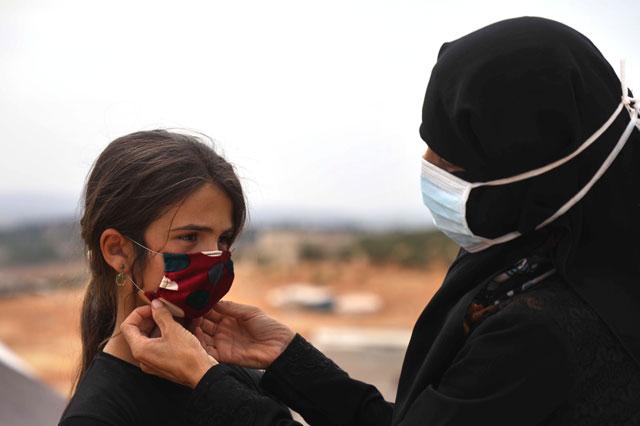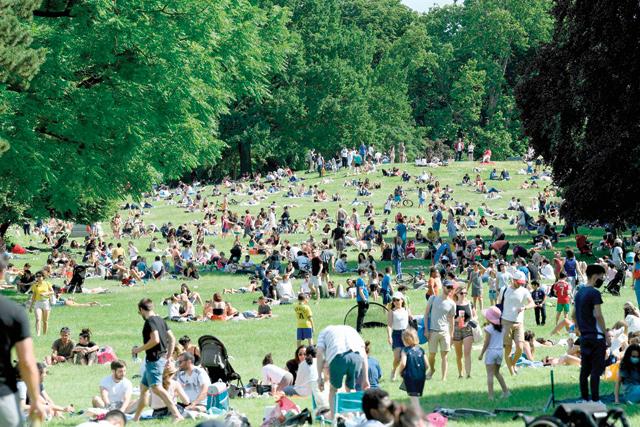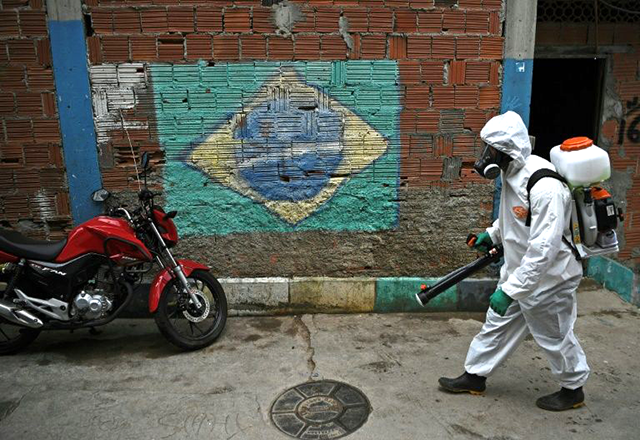You are here
Brazil sees record virus deaths as pandemic surges in Latin America
By AFP - May 20,2020 - Last updated at May 20,2020

Brazil has seen a record number of coronavirus deaths as the pandemic that has swept across the world begins to hit Latin America (AFP photo)
RIO DE JANEIRO — Brazil has seen a record number of coronavirus deaths as the pandemic that has swept across the world begins to hit Latin America with its full force.
After Asia, Europe and North America, Latin America has seen coronavirus infections surge in recent days and now accounts for about 580,000 of the world's nearly five million confirmed cases.
Brazil has been hardest-hit in the region, rising to the third-highest number of cases in the world, as Peru, Mexico and Chile also see steady increases in infections.
Health officials in Brazil reported 1,179 new coronavirus deaths on Tuesday, the first time the daily toll exceeded 1,000, but far-right President Jair Bolsonaro remains bitterly opposed to lockdowns, having described them as unnecessary over a "little flu".
With the outbreak in the world's sixth-largest country expected to accelerate until early June, many Brazilians are deeply worried about the next few weeks.
"Our country is going from bad to worse," said retiree Gilberto Ferreira in Rio de Janeiro.
"We have an inefficient government, and the people also do not obey the rules of the pandemic."
Bolsonaro has refused to accept experts' advice on responding to the pandemic, pressing regional governors to end stay-at-home measures.
And like US counterpart Donald Trump he has promoted the use of anti-malaria drugs against the virus despite studies showing they have no benefit and could have dangerous side effects.
New federal guidelines released by Brazil's health ministry on Wednesday recommended doctors prescribe the drugs, chloroquine and hydroxychloroquine, from the onset of coronavirus symptoms.
Clashes in Chile
Chile is also suffering from a sharp rise in cases and deployed soldiers on the outskirts of its locked-down capital Santiago after clashes with protesters angry about food shortages and job losses.
"People don't have work, they don't have money and they don't have food," said Monica Sepulveda, a 46-year-old unemployed security guard from El Bosque, a working class neighbourhood where residents armed with clubs and stones clashed with riot police.
There were worrying signs in Argentina too, with authorities in the second city Cordoba having to backtrack on easing lockdown measures following a sharp spike in infections.
Experts have been warning for weeks of the devastating impact the pandemic is set to have as it moves from northern countries to the less-developed south.
In Africa, the pandemic is still in its "early days", UN Secretary General Antonio Guterres warned, calling for "global solidarity" with the continent.
"The pandemic threatens African progress," he said.
"It will aggravate longstanding inequalities and heighten hunger, malnutrition and vulnerability to disease," Guterres added, calling for international action to support Africa's health systems and maintain food supplies.
Europe is meanwhile hoping the worst is behind it, with the number of new cases and deaths on a steady decline after the continent suffered nearly 170,000 fatalities from the pandemic.
The global toll now stands at more than 323,000, according to an AFP tally.
Europe looks to save tourism
Lockdown measures are being eased in many parts of Europe, with residents enjoying old freedoms for the first time in weeks.
"I haven't seen the sea for two months," said Helena Prades at a beach in Barcelona, where residents were allowed to stroll from Wednesday.
"We just really wanted to hear the sound of the waves and walk for a bit along the sand."
Face masks are now mandatory for anyone aged six and over in public where social distancing is not possible, Spain's government said on Wednesday, as the country emerges from one of the world's toughest lockdowns.
European officials are now scrambling to try to save the summer tourism season, which is crucial for the continent's economies.
European Union tourism ministers were set to hold a virtual meeting Wednesday and authorities in Greece were to announce plans for reopening the country to travel.
Top French chef Guy Savoy, who is doing home deliveries of his famed artichoke soup with truffles after his Paris restaurant closed its doors, said he was anxious for tourists to return.
"Paris needs the whole planet to work. If there are no tourists, half of the restaurants will disappear," Savoy said.
Pressure is also building in the United States -- the world's worst-hit country with nearly 92,000 deaths and more than 1.5 million cases -- for an end to confinement measures that have hammered the economy and left tens of millions unemployed.
Trump blames China 'incompetence'
Trump is especially keen to reopen businesses ahead of an election due in November, and his Treasury Secretary Steven Mnuchin warned the American economy risks suffering "permanent damage" the longer the lockdown continues.
The president has blamed China for the pandemic and lashed out at Beijing again in an early morning tweet on Wednesday.
"It was the 'incompetence of China', and nothing else, that did this mass Worldwide killing," he tweeted.
He has also accused the World Health Organisation(WHO) of failing to contain the pandemic, threatening to permanently cut US funding to the agency.
The WHO agreed this week to launch an independent investigation into its handling of the outbreak.
Countries in Asia have also been gradually reopening, with hundreds of thousands of South Korean students lining up for temperature checks and given hand sanitiser as they returned to school after two months off.
And India said domestic air travel will resume on May 25 after a two-month shutdown, even as the country reported its biggest daily jump in coronavirus infections, with 5,611 new cases in 24 hours.
Nearly 107,000 cases have been reported in India and more than 3,300 people have died, with experts predicting that infections will peak in June-July.
Despite the crisis in some of the country's biggest cities, the Indian government has insisted it is keeping the spread under control in the world's second-most populous nation.
Related Articles
PARIS — Recorded deaths from the coronavirus neared 650,000 on Monday as the disease surged back at hotspots in Asia, Europe and the America
MOSCOW — Countries across Europe took bolder steps in easing coronavirus lockdowns, with schools, pubs, parks and pools reopening in places,
PARIS — The EU unveiled a proposed 750-billion-euro recovery plan Wednesday to get the continent back on its feet after the devastation wrea














